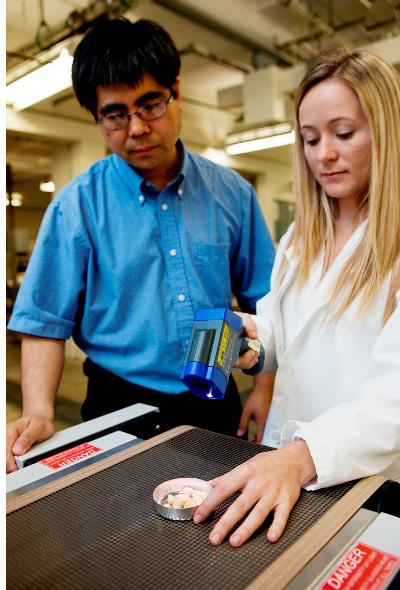UF/IFAS Moves Closer In Quest For Peanut That Won’t Cause Allergic Reaction
September 30, 2014
A University of Florida scientist has moved one step closer to his goal of eliminating 99.9 percent of peanut allergens by removing 80 percent of them in whole peanuts.
Scientists must eliminate peanut allergens below a certain threshold for patients to be safe, said Wade Yang, an assistant professor in food science and human nutrition and member of UF’s Institute of Food and Agricultural Sciences.
 If Yang can cut the allergens from 150 milligrams of protein per peanut to below 1.5 milligrams, 95 percent of those with peanut allergies would be safe. It’s challenging to eliminate all peanut allergens, he said, because doing so may risk destroying peanuts’ texture, color, flavor and nutrition. But he said he’s using novel methods like pulsed light to reach an allergen level that will protect most people.
If Yang can cut the allergens from 150 milligrams of protein per peanut to below 1.5 milligrams, 95 percent of those with peanut allergies would be safe. It’s challenging to eliminate all peanut allergens, he said, because doing so may risk destroying peanuts’ texture, color, flavor and nutrition. But he said he’s using novel methods like pulsed light to reach an allergen level that will protect most people.
Yang, whose study is published online in this month’s issue of the journal Food and Bioprocess Technology, cautioned that he has done peanut allergen experiments only in a laboratory setting so far. He hopes to eventually conduct clinical trials on animals and humans.
Dr. Shih-Wen Huang, professor emeritus in the Department of Pediatrics and Head of the Pediatric Allergy Clinic at UF Health, is familiar with the UF/IFAS research. Huang outlined more steps in the peanut allergen research.
“I am pleased to see their work is progressing well,” Huang said. “However, more challenges are waiting until the final products are accepted from the public, especially the patients with peanut allergies.”
Two years ago, Yang was using his technique on peanut extract. He’s now testing it on the peanut itself. In his 2012 study, he removed up to 90 percent of the allergic potential from peanut protein extracts.
“This process proves that pulsed light can inactivate the peanut allergenic proteins and indicates that pulsed light has a great potential in peanut allergen mitigation,” Yang said.
About 1.9 million people, or 0.06 percent of U.S. residents, are allergic to peanuts, according to the National Institute of Allergy and Infectious Diseases, part of the National Institutes of Health.
Reactions can range from skin rashes to anaphylaxis, which can be fatal. Currently, the best way for those allergic to peanuts to stay safe is to avoid them, according to the NIH. Many people carry epinephrine injectors that help offset their allergy symptoms until they reach a hospital.
Pictured: Wade Yang, left, an assistant professor in food science and human nutrition at UF/IFAS, used pulsed light to remove 80 percent of the allergens from a whole peanut. By doing so, he moves closer to his goal of eliminating 99.9 percent of allergens in peanuts. Courtesy photo for NorthEscambia.com, click to enlarge.
Comments
One Response to “UF/IFAS Moves Closer In Quest For Peanut That Won’t Cause Allergic Reaction”



Maybe 4Hers and others would be more appreciative of other uses of the lowly peanut. Step up to the plate, IFAS!